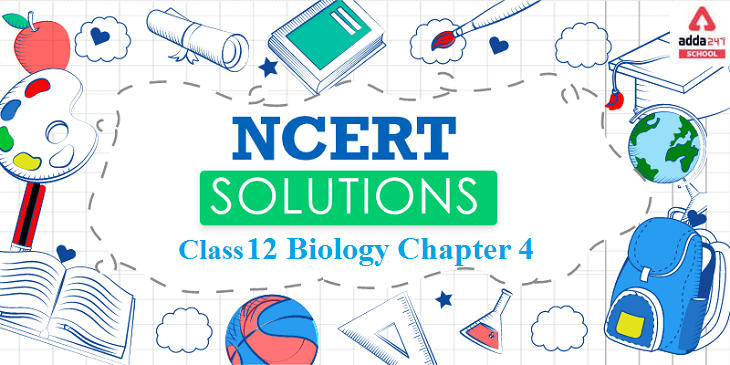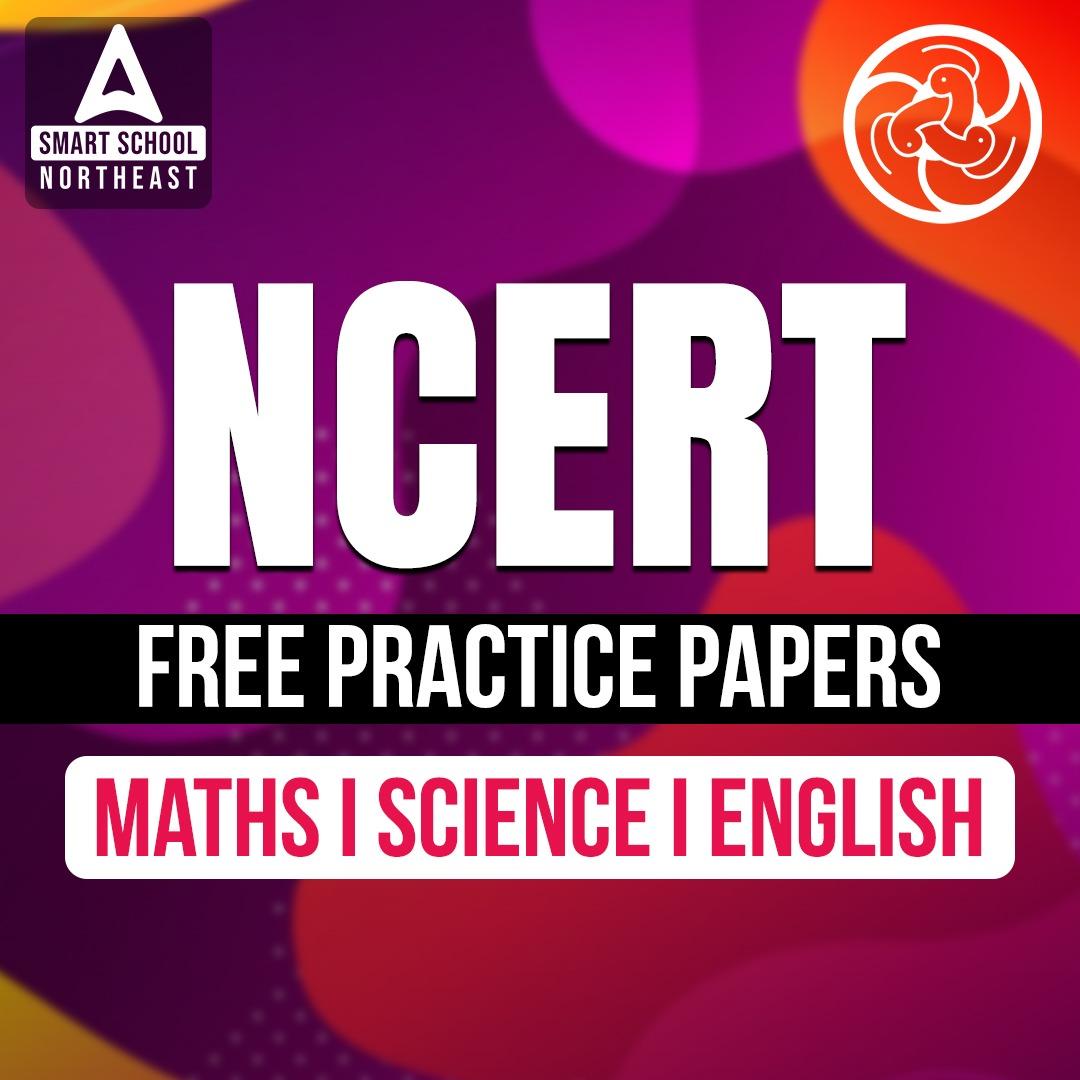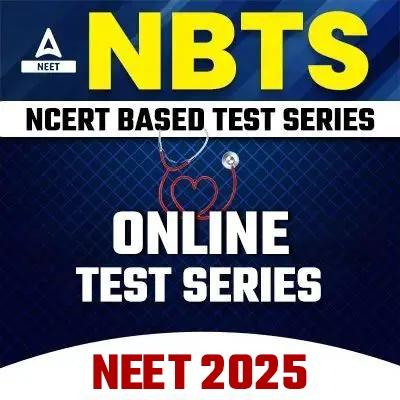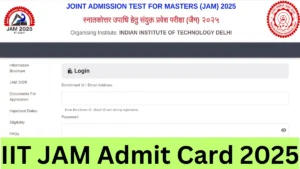Table of Contents
Ncert Solutions For Class 12 Biology Chapter 4 in English
Class 12 Biology NCERT Solutions Chapter 4: Adda 247 provides NCERT Solutions for Class 12 Biology Chapter 4 which is for the students who want to go ahead in life and achieve great marks in their examinations. The NCERT Solutions for class 12 are provided by the teachers who are experts of their subjects. The solutions are set according to the rules formulated by the NCERT class 12 biology and in the language that can be understood by every student. By these reading the solutions students can build up a strong base easily. The NCERT class 12 Biology solutions covers the chapters 1 to 16 with the important questions and the answers in a detailed way.
Examinations can be threatening for some people, a proper learning of the concepts is the key to crack the examination. Students rely on the solutions of the NCERT provided by Adda 247. The solutions are formulated by the experts of the subjects who have tremendous knowledge in their subjects.
These NCERT Solutions of class 12 help the students to get familiarized with the textbooks. The students can access the solutions anywhere while browsing the web easily. The solutions are very precise and accurate.
NCERT Solutions for Class 12 Biology Chapter 4 – Reproductive health
The chapter provides information about Reproductive health. A total wellbeing in all aspects of reproduction such as physically, mentally and emotionally is called reproductive health. All the reproductive organs should be healthy with normal functions. Major problems associated with reproductive health: Over-population- explosion in population causes a scarcity of every basic need and hence affect the well-being of reproductive health. Sex education- due to lack of sex education people are not concerned about safe and hygienic sexual practice. Adolescence related changes- the changes which take place in adolescent can lead to sex abuse and hence can affect reproductive health. Sexually transmitted diseases- sexually transmitted diseases can affect the reproductive health.
Features of the NCERT Solutions for Class 12 Biology Chapter 4 – Reproductive health
NCERT Solutions of class 12 have been answered based on the important information on the question.
- The columns are used wherever necessary.
- Solutions are solved point wise and accurately answered point to point.
Important Questions of Ncert Solutions for Class 12 Biology Chapter 4: Reproductive health
Question 1. What do you think is the significance of reproductive health in a society?
Answer: Reproductive health refers to complete physical, emotional. behavioural and social well-being in all aspects of reproduction. The significance of reproductive health is as follows:
- Attainment of reproductive health can possible reduces the chances of STDs such as AIDS, hepatitis, gonorrhoea etc. as a reproductively healthy society have knowledge about transmission of these diseases, thus these can be prevented.
- In a reproductively healthy society, people will have knowledge about birth control and family planning, thus aiding in population control.
Question 2. Suggest the aspects of reproductive health which need to be given special attention in the present scenario.
Answer: Reproductive health is the total well-being in all aspects of reproduction. The aspects which have to be given special attention in the present scenarios are
1. Counselling and creating awareness among people, especially the youth, about various aspects of reproductive health, such as sexually transmitted diseases, available contraceptive methods, case of pregnant mothers, adolescence, etc.
2. Providing support and facilities such as medical assistance to people during pregnancy, STDs, abortions, contraceptives, infertility, etc. for building a reproductively healthy society
Question 3. Is sex education necessary in schools? Why?
Answer: Sex education is necessary in schools because it provides correct information about of reproductive health, related organs, about adolescence and sexually transmitted diseases. As well as it creates awareness to protect people from the misconceptions about various sex related issues.
Question 4. Do you think that reproductive health in our country has improved in the past 50 years? If yes, mention some such areas of improvement.
Answer: Yes, the reproductive health has tremendously improved in India in the last 50 years. The areas of improvement are as follows.
(1) Massive child immunization programme, which has lead to a decrease in the infant mortality rate
(2) Maternal and infant mortality rate, which has been decreased drastically due to better post-natal care
(3) Family planning, which has motivated people to have smaller families
(4) Use of contraceptive, which has resulted in a decrease in the rate of sexually transmitted diseases and unwanted pregnancies
Question 5. What are the suggested reasons for population explosion?
Answer: The human population is increasing day by day, leading to population explosion. It is because of the following two major reasons.
(a) Decreased death rate
(b) Increased birth rate and longevity
The death rate has decreased in the past 50 years. The factor leading to decreased death rate and increased birth rate are control of diseases, awareness and spread of education, improvement in medical facilities, ensured food supply in emergency situation, etc. All this has also resulted in an increase in the longevity of an individual.
Question 6. Is the use of contraceptives justified? Give reasons.
Answer: Yes, the use of contraceptives is justified due to the following reasons:
1) Contraceptive devices help in reducing unwanted pregnancies, which reduces increased birth rate and hence, checks population explosion.
2) Contraceptives provide an option for planning the family by spacing the pregnancies and avoiding unwanted pregnancies.
3) Contraceptives also prevent the incidence of sexually-transmitted diseases, AIDS etc. to some extent.
Question 7. Removal of gonads cannot be considered as a contraceptive option. Why?
Answer: Removal of gonads cannot be reversed. The sex hormones are produced by gonads which are necessary for accessory sex organs and certain functions. Sexual life of the person is affected after removal of gonads. A contraceptive should be user friendly, reversible and available. Hence, removal of gonads cannot be considered as a contraceptive option.
Question 8. Amniocentesis for sex determination is banned in our country. Is this ban necessary? Comment.
Answer: Contraceptive devices are used to prevent unwanted pregnancy and to prevent the spreading of STDs.
There are many methods, such as natural, barrier, oral, and surgical methods, that prevent unwanted pregnancy.
However, the complete removal of gonads cannot be a contraceptive option because it will lead to infertility and unavailability of certain hormones that are required for normal functioning of accessory reproductive parts.
Therefore, only those contraceptive methods can be used that prevent the chances of fertilization rather than making the person infertile forever.
Contraceptives are practiced only before or during the period of sexual act and are only temporary requirements.
Question 9. Suggest some methods to assist infertile couples to have children.
Answer: Infertile couples may be helped to have children by the following techniques:
| Technique | Working |
| 1. In-vitro fertilization Embryo transfer (IVF-ET) technique • ZIFT (Zygote intra fallopian transfer) • IUT (Infra-uterine transfer) | Ovum of female and sperms of male are induced to form zygote in a culture medium and then embryo is transferred in the female for further developments. It is of two types: Embryo is transferred in the fallopian tube of female at the stage of 8 blastomeres. Embryo is transferred in the uterus at 32-elled stage. |
| 2. GIFT (Gamete intra fallopian transfer) | Transfer of an ovum of a female into fallopian tube of another female for fertilization by sperms of former’s husband. |
| 3. ICSI (Intra-cytoplasmic sperm injection) | Sperm of male is directly injected into ovum of female. |
| 4. AI (Artificial insemination) | Sperms of husband (AIH) or a donor male are artificially introduced into the vagina or uterus of the female. |
Question 10. What are the measures one has to take to prevent from contracting STDs?
Answer: The following measures must be taken to prevent from contracting STDs:
- Avoid sexual intercourse with unknown or multiple partners.
- Use of condoms during sexual intercourse.
- Consulting a qualified doctor immediately for treatment in case of doubt of infection.








 JEE Mains Exam City Intimation Slip 2025...
JEE Mains Exam City Intimation Slip 2025...
 YCMOU Hall Ticket 2024-25 OUT, Check Dow...
YCMOU Hall Ticket 2024-25 OUT, Check Dow...
 IIT JAM Admit Card 2025 Out at joaps.iit...
IIT JAM Admit Card 2025 Out at joaps.iit...






























